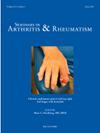接受托西珠单抗治疗的巨细胞动脉炎复发。对407名临床实践中的患者进行的多中心回顾性研究。
IF 4.6
2区 医学
Q1 RHEUMATOLOGY
引用次数: 0
摘要
本文章由计算机程序翻译,如有差异,请以英文原文为准。
Relapses in giant cell arteritis treated with tocilizumab. Retrospective multicenter study of 407 patients in clinical practice
Objective
Tocilizumab (TCZ) is the only biologic approved in Giant Cell Arteritis (GCA). In clinical trials around a quarter of patients relapse during TCZ treatment. We assess the frequency, features and factors associated with relapses in a wide series of GCA patients in a real-world setting.
Methods
National multicenter observational study of GCA patients treated with TCZ between 2016 and 2021. The variables collected at TCZ initiation were demographic, clinical, laboratory, temporal artery biopsy, and imaging findings, corticosteroids dose, previous therapies and TCZ therapeutic schedule. We perform a comparative study between patients with/ without relapses (bivariate analysis) and a study of factors associated with relapse (multivariate logistic).
Results
We study 407 patients (295 women; mean age 73.6 ± 8.9 years). After a mean follow-up of 25.3 ± 21.7 months, relapses were observed in 63 of 407 (15.5 %) patients. At TCZ initiation, no differences were observed between both groups (with/without relapses) in demographic, clinical and laboratory features or corticosteroid dose. The median time to the first relapse was 12 [6–24] months being the most frequent manifestations polymyalgia rheumatica (47.6 %), and headache (12.7 %). In multivariate logistic regression analysis, the set of variables associated with GCA relapses were TCZ initiation later than 6 weeks (OR 3.446 [1.196- 9.931]), optimization (OR 2.803 [1.507–5.215]) and administration of IV TCZ (OR 2.327 [1.244–4.353]) and previous therapies to TCZ (OR 5.062[2.402–10.665]).
Conclusion
In this series, GCA relapses were observed in 15 % of patients, all of them non-severe. Relapses were associated with TCZ therapeutic schedule, such as IV administration, optimization, delayed initiation and previous therapies to TCZ.
求助全文
通过发布文献求助,成功后即可免费获取论文全文。
去求助
来源期刊
CiteScore
9.20
自引率
4.00%
发文量
176
审稿时长
46 days
期刊介绍:
Seminars in Arthritis and Rheumatism provides access to the highest-quality clinical, therapeutic and translational research about arthritis, rheumatology and musculoskeletal disorders that affect the joints and connective tissue. Each bimonthly issue includes articles giving you the latest diagnostic criteria, consensus statements, systematic reviews and meta-analyses as well as clinical and translational research studies. Read this journal for the latest groundbreaking research and to gain insights from scientists and clinicians on the management and treatment of musculoskeletal and autoimmune rheumatologic diseases. The journal is of interest to rheumatologists, orthopedic surgeons, internal medicine physicians, immunologists and specialists in bone and mineral metabolism.

 求助内容:
求助内容: 应助结果提醒方式:
应助结果提醒方式:


